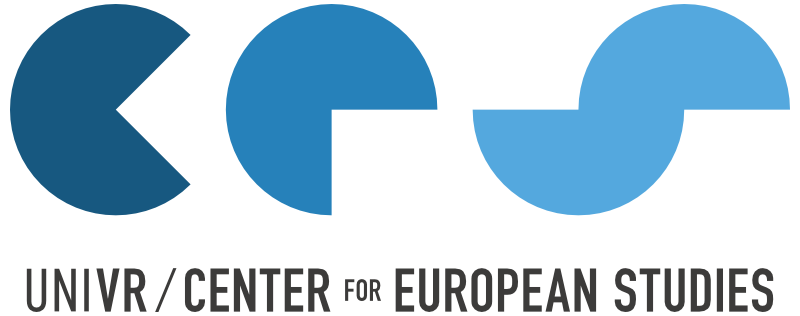Director

Renato Camurri is full professor of Contemporary History at the University of Verona. He graduated in 1986 in Political Science at the University of Bologna. In 1992 he obtained a PhD in Contemporary History at the University of Turin and from 1993 to 1995 he carried out research activities as a post-doctoral fellow at the University of Venice. He has been an invited speaker at various European and American universities including: Valencia, Madrid (Complutense), Alicante, Paris Panthéon-Sorbonne, Paris EHESS, Paris Ècole Normale Supérieure, Lyon, Oxford, Harvard, MIT, Yale, Boston University, Columbia University, Toronto, Liege, European University Institute.
In 2005 he has been Lauro De Bosis Visiting Fellow at Harvard University. In 2006 Visiting Professor at the École des Hautes Études en Sciences Sociales, Paris. In 2007 Fulbright Research Fellow at the Center for European Studies of Harvard. In 2011 Visiting Fellow at the latter institution. In 2012 he was Fernand Braudel Senior Fellow at the European University Institute in Florence. From 2012 to 2019 he has been a frequent Visiting Scholar at the Center for European Studies at Harvard University where he is one of the founders and coordinators of the annual Gaetano Salvemini Colloquium in Italian History and Culture. At Donzelli Editore he directs the series Italians from Exile. Since November 2020 he is the director of the Center for European Studies at the University of Verona.
His main research interests concern: the history of European elites and ruling classes in the nineteenth and twentieth centuries, the history of exile and cultural migrations, the history of transatlantic cultural relations, the intellectual history of twentieth-century Europe, the transnational history of anti-fascism. He also deals with biographies and correspondence of personalities of the ninth and twentieth centuries.
Email: renato.camurri@univr.it
Renato Camurri è professore ordinario di Storia contemporanea presso l’Università di Verona. Si è laureato nel 1986 in Scienze Politiche presso l’Università di Bologna. Nel 1992 ha conseguito il dottorato di ricerca in Storia contemporanea all’Università di Torino e dal 1993 al 1995 ha svolto attività di ricerca come borsista post-dottorato all’Università di Venezia. È stato relatore invitato in varie università europee e americane tra cui: Valencia, Madrid (Complutense), Alicante, Parigi Panthéon-Sorbonne, Parigi EHESS, Parigi Ècole Normale Supérieure, Lione, Oxford, Harvard, MIT, Yale, Boston University, Columbia University, Toronto, Liegi, European University Institute.
Nel 2005 è stato Lauro De Bosis Visiting Fellow presso Harvard University. Nel 2006 Visiting professor all’École des Hautes Études en Sciences Sociales, Parigi. Nel 2007 Fulbright Research Fellow presso il Center for European Studies di Harvard. Nel 2011 Visiting Fellow sempre presso quest’ultima istituzione. Nel 2012 è stato Fernand Braudel Senior Fellow all’European University Institute di Firenze. Dal 2012 al 2019 è stato frequentemente Visiting Scholar presso il Center for European Studies di Harvard University dove è tra i fondatori e coordinatori dell’annuale Gaetano Salvemini Colloquium in Italian History and Culture. Presso Donzelli Editore dirige la serie “Italiani dall’esilio”.
Dal novembre 2020 è il direttore del Center for European Studies dell’Università di Verona.
I suoi principali interessi di ricerca riguardano: la storia delle élites e delle classi dirigenti europee del XIX e XX secolo, la storia dell’esilio e delle migrazioni culturali, la storia delle relazioni culturali transatlantiche, la storia intellettuale del Novecento europeo, la storia transnazionale dell’antifascismo. Si occupa inoltre di biografie e carteggi di personalità dei secoli IX e XX.
Executive Committee

Enrico Acciai teaches Global History at the University of Rome “Tor Vergata”. He works on the history of European anti-fascism, the history of anarchism and the history of transnational voluntary service in arms. His publications include: Garibaldi’s Radical Legacy Traditions of War Volunteering in Southern Europe (1861-1945) (2020) and Antifascismo, volontariato e guerra civile in Spagna. La Sezione Italiana della Colonna Ascaso (2016).
Email: enrico.acciai@uniroma2.it
Enrico Acciai insegna Global History presso l’Università di Roma “Tor Vergata”. Si occupa di storia dell’antifascismo europeo, storia dell’anarchismo e storia del volontariato transnazionale in armi. Tra le sue pubblicazioni: Garibaldi’s Radical Legacy Traditions of War Volunteering in Southern Europe (1861–1945) (2020) e Antifascismo, volontariato e guerra civile in Spagna. La Sezione Italiana della Colonna Ascaso (2016).

Raffaele Bedarida is an art historian specializing in twentieth-century Italian art and politics. His research has focused on cultural diplomacy, migration, and exchange between Italy and the United States. He is an Associate Professor of Art History at Cooper Union, where he coordinates the History and Theory of Art program. He holds a PhD from the CUNY Graduate Center and an MA from the Università di Siena. His most recent book focuses on the US exile of Jewish, queer artist, Corrado Cagli from Fascist Italy: Corrado Cagli: La pittura, l’esilio, l’America (2018). His upcoming book is entitled Exhibiting Italian Art in the US, Futurism to Arte Povera: Like a Giant Screen (Routledge).
Email: raffaele.bedarida@cooper.edu
Raffaele Bedarida è professore associato di storia dell’arte contemporanea all’università Cooper Union, New York, dove dirige il programma di Storia e teoria dell’arte. Studia gli scambi artistici, la diplomazia culturale e la migrazione tra Italia e Stati Uniti nel XX secolo. Formatosi a Siena con E. Crispolti, ha conseguito il dottorato presso il CUNY Graduate Center di New York con E. Braun. Ha pubblicato due monografie in italiano: Bepi Romagnoni. Il nuovo Racconto (2005) e Corrado Cagli. La pittura, l’esilio, l’America (2018). Il suo libro Exhibiting Italian Art in the US, Futurism to Arte Povera: Like a Giant Screen è di prossima uscita con Routledge.

Giovanni Bernardini is researcher in Contemporary History at the University of Verona. He was Marie-Sklodowska-Curie Fellow at the European University Institute (Florence), after working as researcher at the Italian-German Historical Institute in Trento. His research interests include: the history of planning policies in European democracies after the Second World War, German history during the XX century, the comparative study of European social democratic parties, the political history of Europe after the First World War, the South Tyrol question in Italian history. Among his most recent publications: Parigi 1919. La Conferenza di pace (2019); with C. Cornelissen (ed.), La medialità della storia. Nuovi studi sulla rappresentazione della politica e della società (2019).
Email: giovanni.bernardini@univr.it
Giovanni Bernardini è ricercatore di storia contemporanea presso l’Università degli Studi di Verona. In precedenza, ha ottenuto una Marie-Sklodowska-Curie Fellowship presso lo European University Institute di Firenze ed è stato ricercatore dell’Istituto Storico Italo-Germanico di Trento. I suoi interessi di ricerca includono la storia delle politiche di programmazione nelle democrazie europee del secondo dopoguerra, la storia della Germania nel Ventesimo Secolo, lo studio comparato dei partiti socialdemocratici europei, la storia politica del Primo Dopoguerra europeo, la vicenda dell’Alto Adige nella storia italiana. Tra le sue pubblicazioni più recenti: Parigi 1919. La Conferenza di pace (2019) e la curatela, con C. Cornelissen, La medialità della storia. Nuovi studi sulla rappresentazione della politica e della società (2019).

Tullia Catalan is Associate Professor of Contemporary History at the University of Trieste. Her research interests include: the history of the European Jews from the Emancipation until today; narratives and representations of anti-Semitism and anti-Slavism in the Upper Adriatic area; the Public History in a border region. She is one of the editors of the journals “Quest: Issues in Contemporary Jewish History”, and “Memoria e Ricerca” and is the scientific supervisor of the Jewish Museum “Carlo and Vera Wagner” in Trieste. Among her recent publications: Under Observation: Italian Jewry and European Jewish Philanthropic Organizations in 1938-1939, in Italian Jewish Networks from the Seventeenth to the Twentieth Century, eds. F. Bregoli et al. (2018) pp. 127-149; Antislavismo. Discorsi e pratiche in Italia e nell’Europa sudorientale tra Otto e Novecento, a cura di T. Catalan ed E. Mezzoli, in “Memoria e Ricerca”, n. 3, 2018; The Board of Deputies of British Jews and the Initial Phase of the Italian Racial Laws: Reactions and Strategies (1938-1940), in “Journal of Modern Italian Studies”, vol. 24, 1, 2019.
Email: catalant@units.it
Tullia Catalan è professore associato di Storia contemporanea presso l’Università di Trieste. I suoi interessi di ricerca riguardano i temi legati alla storia dei rapporti fra il mondo ebraico e la società non ebraica fra Ottocento e Novecento in Italia e in Europa centro-occidentale. Di recente si è occupata di discriminazioni sul lungo periodo, prendendo in esame i temi dell’antisemitismo e dell’antislavismo. È membro del comitato di direzione delle riviste “Quest: Issues in Contemporary Jewish History” e di “Memoria e Ricerca”. Fra le pubblicazioni più recenti: Under Observation: Italian Jewry and European Jewish Philanthropic Organizations in 1938-1939, in Italian Jewish Networks from the Seventeenth to the Twentieth Century, eds. F. Bregoli et al. (2018), pp. 127-149; The Board of Deputies of British Jews and the Initial Phase of the Italian Racial Laws: Reactions and Strategies (1938-1940), in “Journal of modern italian studies”, v. 24, 1, (2019); The Construction of the Enemy in two Jewish Writers: Carolina Coen Luzzatto and Enrica Barzilai Gentilli, in Rethinking the Age of Emancipation. Comparative and Transnational Perspectives on Gender, Family and Religion in Italy and Germany 1800-1918, eds. M. Baumeister, et al. (2020).

Valeria Galimi is Associate Professor in Contemporary History at the University of Florence. She has research experience in several areas of contemporary history, in particular the political and cultural history of Contemporary France, the history of antisemitism and fascism in Europe, the history of intellectuals in interwar period, the Second World War and the Holocaust. She is currently writing a volume on political violence and “street antisemitism” in France in the 1930s in four cities: Paris, Strasbourg, Lyon and Oran. In 2020-2022 she is also responsible for a project on the internment camps and detention spaces in Tuscany during WWII funded by the PorFSE 2014-2020 program. She also is responsible with two colleagues for the project “In your face. A Research Collaboratory and a Pedagogical Handbook Mapping Racial and Sexist Visual Stereotypes”. Among her recent publications: Sotto gli occhi di tutti. La società italiana e le persecuzioni contro gli ebrei (2018) e L’antisemitismo in azione. Pratiche antiebraiche nella Francia degli anni Trenta (2006).
Email: valeria.galimi@unifi.it
Valeria Galimi è professoressa associata di storia contemporanea presso l’Università di Firenze. Si occupa di storia contemporanea, in particolare di storia politica e culturale della Francia contemporanea, storia dell’antisemitismo e del fascismo europei, storia degli intellettuali tra le due guerre, Seconda guerra mondiale e Olocausto. Sta attualmente scrivendo un libro sulla violenza politica e sullo “street antisemitism” in Francia negli anni ’30 del XX secolo in quattro città: Parigi, Strasburgo, Lione e Oran. Nel 2020-2022 è anche responsabile di un progetto sui campi di internamento e detenzione in Toscana durante la Seconda guerra mondiale promosso dal programma PorFSE 2014-2020. È anche responsabile assieme a due colleghi del Progetto “In your face. A Research Collaboratory and a Pedagogical Handbook Mapping Racial and Sexist Visual Stereotypes”. Tra i suoi lavori: Sotto gli occhi di tutti. La società italiana e le persecuzioni contro gli ebrei (2018) e L’antisemitismo in azione. Pratiche antiebraiche nella Francia degli anni Trenta (2006).

Giacomo Girardi obtained his PhD from the University of Milan and the Univeristé Paris-Est Créteil with a thesis on the seizures of goods organized by the Austrians from 1848 to 1866. His research interest included political history in the XIX century, the counterrevolution and the exile. He is post-doc fellow at the Archivio del Moderno, University of Lugano (Swiss) and adjunct professor at the University of Verona. He is editorial secretary of the journal “Il Risorgimento” and he is about to publish the book I beni degli esuli. I sequestri austriaci nel Lombardo-Veneto (1848-1866) (2022).
Email: giacomo.girardi@univr.it
Giacomo Girardi ha conseguito il dottorato di ricerca in Storia presso l’Università di Milano e l’Université Paris-Est Créteil con una tesi sui sequestri dei beni messi in atto dagli austriaci nei confronti degli esuli lombardo-veneti tra il 1848 e il 1866. Si occupa di storia politica nel lungo Ottocento. È assegnista di ricerca presso l’Archivio del Moderno dell’Università della Svizzera Italiana e cultore della materia in storia contemporanea presso l’Università di Verona. Segretario di redazione della rivista “Il Risorgimento”, è in procinto di pubblicare il volume I beni degli esuli. I sequestri austriaci nel Lombardo-Veneto (1848-1866) (2022).

Alice Gussoni obtained her DPhil (PhD) from the University of Oxford with a thesis on Gaetano Salvemini’s British exile. Currently, she is a Tutor in Italian language at the University of Oxford, Faculty of Medieval and Modern Languages. Her research interests include Fascism and anti-Fascism in Great Britain, exile studies, Italian-U.S. relations, and migration studies. She published Gaetano Salvemini a Londra. Un antifascista in esilio (1925-1934) (2020).
Email: alice.gussoni@mod-langs.ox.ac.uk ; alice.gussoni@outlook.com
Alice Gussoni ha conseguito il dottorato di ricerca in Italian Studies presso l’Università di Oxford, con una tesi sull’esilio britannico di Gaetano Salvemini. Attualmente, è Tutor di lingua italiana presso l’Università di Oxford, Faculty of Medieval and Modern Languages. I suoi interessi di ricerca includono fascismo e antifascismo in Gran Bretagna, il tema dell’esilio, le relazioni tra Italia e Stati Uniti, l’emigrazione italiana di fine Ottocento. Ha pubblicato Gaetano Salvemini a Londra. Un antifascista in esilio (1925-1934) (2020).
Scientific Board

Catherine Brice is professor of contemporary history at Paris-Est Créteil University, member of the Comparative European History Research Center (CRHEC) and honorary member of the Institut Universitaire de France. She works on nineteenth-century Italy, particularly on the cultural history of politics: she studied the place of public monumentality in the Italian space, and more specifically the monument to Victor Emmanuel II of Rome. She then devoted work to the place of the monarchy in the construction of an Italian national identity (La monarchie et la construction de l’identité nationale italienne (1861-1900), Paris, EHESS 2010). As part of an funded project, she opened research on “ fraternity as a category of political commitment (1820-1920)” which led, among other things, to the publication with Sylvie Aprile (co-dir.), Exil et fraternité au XIXème siècle, Bievre editions, Bordeaux, 2013, and Catherine Brice (ed.), La fraternité en action : frères de sang, frères d’armes, frères ennemis en Italie (1824-1924), Collection de l’Ecole française de Rome, 2017. She has since worked on relations between mobility and innovation, more specifically on the relations between exile and political engineering from the 1820s to the 1860s, through the examples of “Italian” political exiles, as well as the conomic aspects of political exile. This project led to the publication with Delphine Diaz (co-director), Mobilities, know-how and innovation in the nineteenth century in Revue d’histoire du 19ème siècle, 2016-n°53 as well as Catherine Brice (eds), Mobilités créatrices. Hommes, savoirs et pratiques en mouvement (xvie-xixe siècle) , dans Diasporas, n°29, 2017, and Catherine Brice (dir.), Sequestration and Confiscation of the Property of Exiles in 19th Century Italy, MEFRIM, 2017-2. She has directed for Cambridge Scholars an edited volume on Exile and the circulation of political practices in the 19th century, 2020.
Email: catherine.brice@gmail.com

Gabriella Gribaudi has taught Contemporary History and History and Memory at the University of Naples Federico II. She has worked on social history of World War II and natural catastrophes. Through a social history perspective she has also dealt with the study of organized crime. She has dealt with methodological issues such as the relationships between history and social sciences, between memory and history. Her main publications: La memoria, i traumi, la storia. La guerra e le catastrofi nel Novecento, Viella, 2020; Combattenti, sbandati, prigionieri. Esperienze e memorie di reduci della Seconda Guerra Mondiale, Donzelli, 2016; Traffici criminali. Camorra, mafie e reti internazionali dell’illegalità (ed. by) Bollati Boringhieri, 2009; Guerra totale. Tra bombe alleate e violenze naziste. Napoli e il fronte meridionale 1940-44, Bollati Boringhieri, 2005; Donne, uomini, famiglie. Napoli nel novecento, Napoli 1999; A Eboli. Il mondo meridionale in cent’anni di trasformazione, Marsilio, 1990; Mediatori. Antropologia del potere democristiano nel Mezzogiorno, Rosenberg e Sellier, Torino, 1980.
Email: gabri.gribaudi@gmail.com

Kiran Klaus Patel holds the chair of European history at Ludwig Maximilian University Munich where he also serves as the founding director of Project House Europe, LMU’s center for interdisciplinary research on the history of contemporary Europe. Before joining LMU, he held professorships at Maastricht University (2011-2019) and the European University Institute in Florence, Italy (2007-2011), and an assistant professorship at Humboldt University in Berlin (2002-2007). He has been (inter alia) a visiting fellow/professor at the Ecole des Hautes Etudes en Science Sociales in Paris, the Free University of Berlin, Freiburg University, Harvard University, the London School of Economics, Sciences Po in Paris and the University of Oxford. His latest publications include: Europäische Integration. Geschichte und Gegenwart (Munich: Beck, 2022); Project Europe: A History (Cambridge University Press, 2020) (German version: Beck, 2018); The New Deal: A Global History (Princeton: Princeton University Press, 2016) (Italian version: Einaudi, 2018); European Integration and the Atlantic Community in the 1980s (New York: Cambridge University Press, 2013; ed. with Kenneth Weisbrode); The Historical Foundations of EU Competition Law (Oxford University Press, 2013; ed. with Heike Schweitzer).
Email: patel@lmu.de

Paolo Pombeni is Emeritus Professor at the Bologna University where he had the chair of History of European Political Systems. Specialist of political history of 19th and 20th centuries, he is member of the editorial board of the reviews “Ricerche di Storia Politica” and “Journal of Political Ideologies”. His most recent books are “La questione costituzionale in Italia” (2016), “Cosa resta del 68” (2018), “la buona politica (2019), “Sinistre. Un secolo di divisioni” (2021), “L’Apertura. L’Italia e il centro sinistra 1953-1963” (2022) all published by Il Mulino. He writes colums for the newspaper “Il Messagero” (Rome). A complete curriculum and list of his essays can be found at www.academia.edu.
Email: paolo.pombeni@unibo.it
